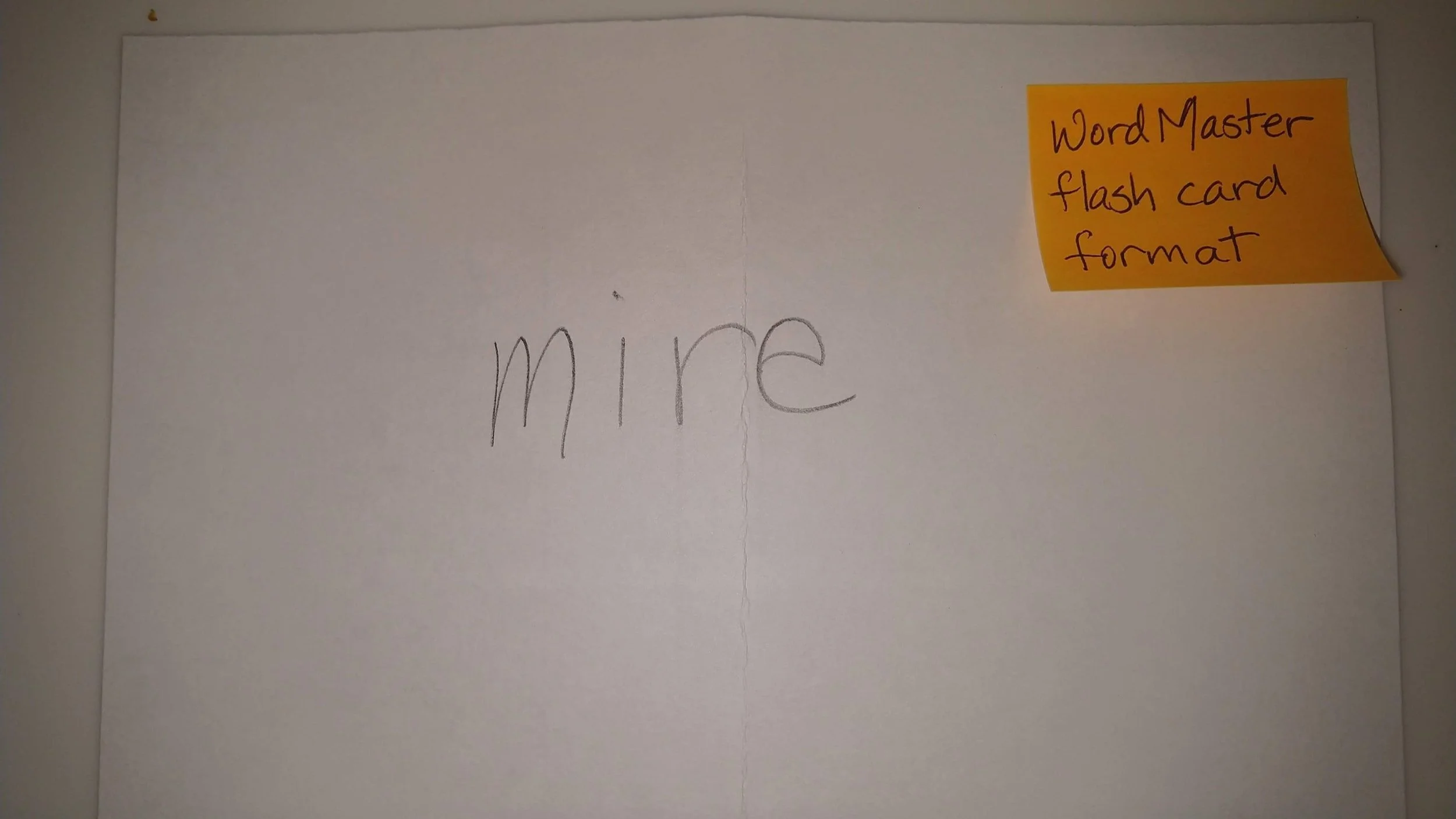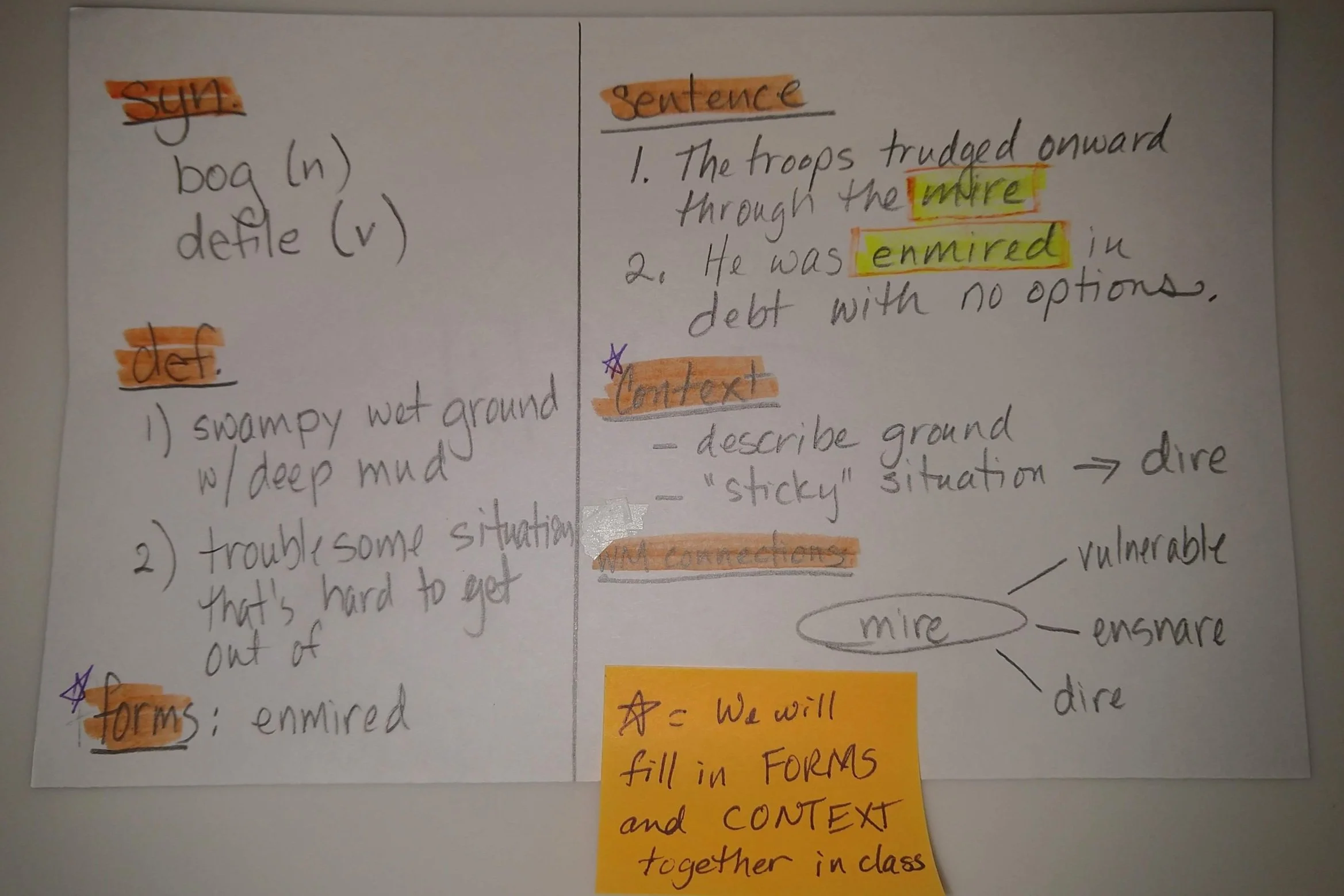WordMasters Analogy Challenge
Winter List #2 is HERE
Level 7 Gold WordMasters List #1
WM Analogies Test #2 will be in March
windfall, expedite, stentorian, ardor, forswear, noisome, schadenfreude, besmirch, insolvent, parvenu, belie, choleric, aspersion, grimace, convoluted, indigent, smirk, cerebral, diatribe, quaff, plaintive, languor, rue, delude, alacrity.
Words in (parentheses) are other forms of the word.
WordMasters Challenge™ Tips
Sample analogy question:
LIFE OF CRIME : FORSWEAR :: VIOLENCE :
a. avow
b. rue
c. repudiate
d. belie
e. expedite
To succeed in this competition, you will have to understand the exact meanings of all your words, and you will have to reason carefully about the relationships shown in the pairs. In the example above, the correct answer is (c) repudiate because if you FORSWEAR a LIFE OF CRIME, you vow not to commit crimes; in a similar way, if you REPUDIATE VIOLENCE, you vow not to commit or accept violent behavior.
Here are some tips to help you get ready for the WordMasters Challenge™:
After you have learned the meanings of your words, think about possible relationships among them.
Which words have similar meanings?
Which words have nearly opposite meanings?
Remember, some words have more than one meaning.
Think about some categories into which several words might be grouped.
Be sure you understand the part of speech of a word (for example, noun, verb or adjective) as it is used in the analogy.
Many words on this list (such as “grimace”, “smirk” and “quaff”) can be either a noun or a verb depending upon how they are used. “Indigent” can be a noun or an adjective.
Pay special attention to the prefixes and suffixes of words because they are often clues to meaning and part of speech.
• Familiarize yourself with other forms of these words, for example:
o Not just “rue”, but also “rueful”
o Not just “delude”, but also “deluded” and “delusion”
o Not just “ardor”, but also “ardent”
o Not just “languor”, but also “languorous” and “languid”
RESOURCES:
An excellent online source for sentences is wordhippo.com (select sentences from the blue tabs at the top of the page.) Another excellent resource, especially for definitions and sentences, is https://www.merriam-webster.com/ This is much better than dictionary.com. However because it is a free site rather than a paid subscription site, there are ads. I’ve provided what I think are good sentences and definitions above.
Level 7 Gold WordMasters List #1 is HERE
Good definitions and sentences for most of list 2: quick list of definitions and some sentence here for list #2

2023-2024
Join our online classroom
Vocabulary.com creates flash cards with definitions, sample sentences, context hints and etymology (history and orgins of the word) for our vocabulary lists that I select or create.
Create an account by clicking the blue button above (I have a paid subscription which allows 25 of my students to use this site.) Use a nickname and your first name and last initial.
From August through September we’ll study words from Shakespeare.
Prepare for the national challenge!
Test #1 is November 28th, 2023! Test #2 is in March.
Step 1: Learn the 16 types of analogies with easy words.
Print these practice sets (one per week) and bring to class so we can work on them together.
Download & Print Practice Analogies Set D - Print Week 0
Download & Print Practice Analogies Set C - Print Week 1
Download & Print Practice Analogies Set B - Print Week 6
Download & Print Practice Analogies Set A - Print Week 8
Step 2: Learn the words on Fall List number #1 so you can use these words in analogies.
To learn the list words you will make study flashcards like the models below. They’ll include
part of speech
definitions (usually 2)
forms or variations on the word e.g. inertia, inert, or adulate, adulation, or abhor, abhorrent, (We’ll do this part in class together or you can use the listed variations of the word which I added into our list above.)
an example sentence (this means a sentence written by an adult—you can use dictionary.com to find the word used in a sentence)
Bonus: include synonyms and antonyms.
Leave a space to write down other WM words it might be related to and the context. (That’s what the sticky note is telling you— leave space for other forms of the word, context and other WM words it could be related to.)
See sample flashcard below!
Resources for making your flashcards
Best definitions and sentences, is https://www.merriam-webster.com/ This is much better than dictionary.com. However because it is a free site rather than a paid subscription site, there are ads. I’ve made a quick list of definitions and some sentence here for list #2
Good source for sentences is wordhippo.com (select sentences from the blue tabs at the top of the page.)
front
back
Fall List #1
Level 7 Gold WordMasters List
WM Analogies Test will be Week 11, November 28.
1. vendetta 2. adulate (adulation, adulatory) 3. impassive 4. opulence 5. yaw 6. baroque 7. reprieve 8. repudiate (repudiation) 9. surreptitious 10. martinet 11. veer 12. histrionic 13. harridan 14. execrate 15. intuitive (intuition) 16. repartee 17. enhance (enhancement) 18. querulous 19. inertia (inert) 20. shroud (enshroud) 21. incisive (incisiveness) 22. levity 23. disavow (disavowal) 24. visceral 25. détente (this word is French and should have a silent “e” at the end. I apologize for not catching that my webpage software spell checker deleted the e!)
Words in (parentheses) are other forms of the word.
WordMasters Challenge™ Tips
• After you have learned the meanings of your words, think about possible relationships among them.
o Which words have similar meanings?
o Which words have nearly opposite meanings?
o Remember, some words have more than one meaning.
• Think about some categories into which several words might be grouped.
• Be sure you understand the part of speech of a word (for example, noun, verb or adjective) as it is used in the analogy.
o Some words on this list (such as “yaw”, “reprieve”, “veer” and “shroud”) can be either a noun or a verb depending upon how they are used.
• Familiarize yourself with other forms of these words, for example:
o Not just “inertia”, but also “inert”
o Not just “intuitive”, but also “intuition”
o Not just “adulate”, but also “adulation” and “adulatory”
o Not just “shroud”, but also “enshroud”
As of Week 9, November 7th, students should have completed flashcards for all 25 words. They may shorten example sentences.
An excellent online source for sentences is wordhippo.com (select sentences from the blue tabs at the top of the page.) Another excellent resource, especially for definitions and sentences, is https://www.merriam-webster.com/ This is much better than dictionary.com. However because it is a free site rather than a paid subscription site, there are ads. I’ve provided what I think are good sentences and definitions above.


